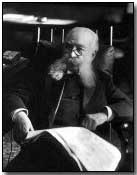Who's Who - Ivan Goremykin
 Ivan Longinovich Goremykin
(1839-1917) emerged from semi-retirement in early 1914 to receive an
appointment as Tsar
Nicholas II's Prime Minister, a position he held for two years until he
lost the support of the Tsarina
Alexandra.
Ivan Longinovich Goremykin
(1839-1917) emerged from semi-retirement in early 1914 to receive an
appointment as Tsar
Nicholas II's Prime Minister, a position he held for two years until he
lost the support of the Tsarina
Alexandra.
Following a career as a government official Goremykin was appointed Minister of Justice in 1891 and, in 1895 (until 1899), Minister of Internal Affairs.
An ultra-conservative, Goremykin was opposed to constitutional reform of any kind. In 1906 he was appointed Prime Minister; however, following his first appearance before the Duma the government received a vote of censure - hardly a vote of confidence in either Goremykin or the government. Goremykin consequently resigned.
Goremykin's reactionary constitutional views however recommended him to the Tsar, who brought Goremykin out of semi-retirement early in 1914 and appointed him Prime Minister for a second time.
Apparently contemptuous of public and Duma opinion (ensuring his unpopularity among fellow politicians), and clearly incompetent in control of government, Goremykin's attitude to the Tsar and the Tsarina - open subservience - nevertheless ensured his survival as Prime Minister until 1916.
The only minister to support the Tsar's disastrous decision to take personal command of the army in August 1915 (thereby relieving his uncle, Grand Duke Nikolai, of the post), the Tsar's subsequent departure for the front left the Tsarina in effective control of government.
Despite Goremykin's unquestioning support of the monarchy, the Tsarina (acting under the advice of Rasputin) determined to replace him with the even more reactionary (and fawning) Boris Sturmer. Consequently the Tsar authorised Goremykin's dismissal in February 1916.
In the wake of the February Revolution in 1917 Goremykin was initially arrested and then freed by Alexander Kerenski to return to his estate in the Caucasus. Having returned home he was murdered during Christmas 1917 by a Bolshevik mob; an unhappy end to an unhappy career.
The "Blue Max" was a reference to the prestigious German Pour le Merite medal.
- Did you know?
